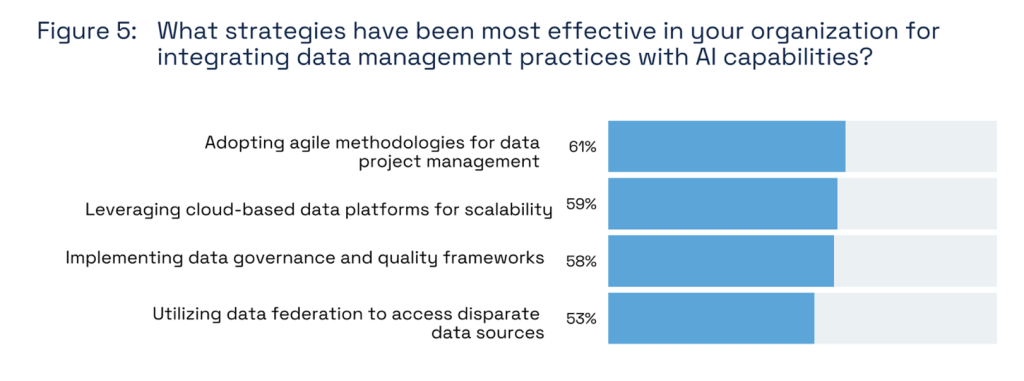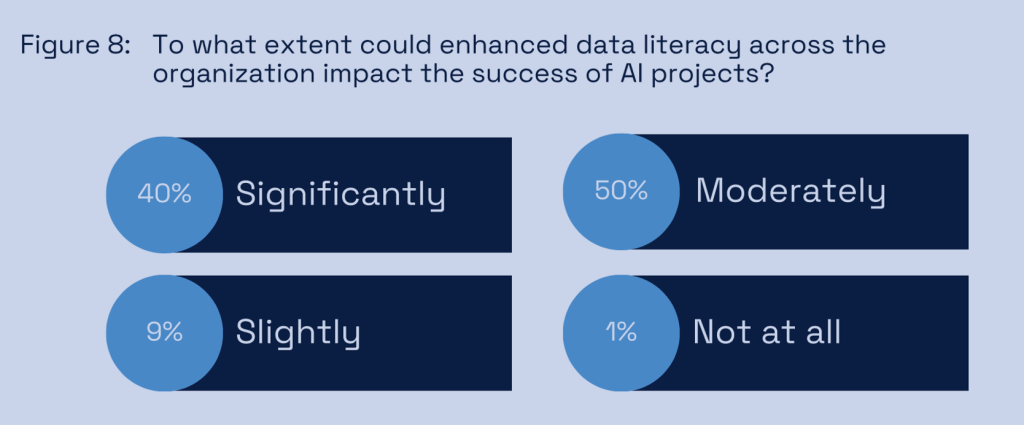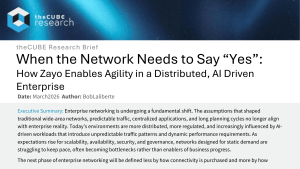As enterprises rush to implement artificial intelligence (AI) across their operations, a new study, The State of Data Management and Its Impact on AI Development reveals that success hinges on a critical factor: robust data management practices. The survey, conducted by my team at theCUBE Research in partnership with Starburst, offers crucial insights for business leaders navigating the AI landscape. We surveyed 300 IT pros with knowledge of enterprise data management techniques and AI development activities. Of these IT pros, 51% were CTOs, 25% were software engineers, 15% were data engineers, and 15% were data architects. They work across financial services, manufacturing, retail and consumer goods, technology and ISVs, and telecommunications in companies ranging from 500-999 employees to 5,000+ employees. Respondents were based in the U.S. and Western Europe.
The State of Data Management and Its Impact on AI Development
Going into this research study, we knew the enthusiasm for AI at this moment in time is palpable, and our survey respondents agreed, with a whopping 87% of organizations reporting a strong or very strong desire to implement AI in the next year. This eagerness is matched by tangible progress, as 86% of respondents indicate they are making significant or very significant strides in their AI initiatives. The primary motivations? Increased efficiency (87%), improved business insights (77%), and fostering innovation (74%).
However, the path to AI success is far from smooth. The study uncovered several key challenges:
- Data Organization Hurdles. Over half of the respondents reported struggling with organizing structured data for machine learning (52%) and unstructured data for retrieval augmented generation (50%).
- Privacy and Security Concerns. The most significant barriers to accessing high-quality data for AI projects are data privacy/security concerns (28%) and data volume (25%).
- Real-Time Data Access. A whopping 62% of respondents cited real-time data access as requiring the most attention for AI success, with 65% considering it important or critical.
- Data Silos. Data silos were identified as a major hurdle. In many organizations, data is dispersed across various systems, across various clouds as well as on-prem, making it difficult to fully integrate and utilize that data for AI projects. Our survey respondents indicated they are addressing this challenge by implementing strategies like centralizing data in a single data lake (47%) or employing hybrid data federation techniques (47%) to enable seamless access across multiple sources.
These findings underscore a crucial point: AI implementation is deeply intertwined with data management practices. Starting with a premise that data is foundational to successful AI initiatives is critical, and adopting an approach that prioritizes data governance, eliminates silos across the organization, and committing to centralizing data so that it’s accessible to those who need it will play an outsized role in overall success with AI initiatives.
And it works! Organizations that align their data strategies with AI goals are seeing better results. In fact, 90% of respondents report that their data management practices are somewhat or very aligned with their AI innovation goals.
Strategies to Address Data Management Challenges and Scale AI Initiatives
To address their data management challenges and speed the path to success with AI initiatives, our research showed that companies are adopting several strategies. These include:
- Data Governance and Access. 52% reported implementing data governance and federated data access strategies.
- Cloud Adoption. 59% are leveraging cloud-based platforms to scale their AI initiatives.
- Agile Methodologies. 61% are using agile approaches for data project management.
- Data Federation. 53% are utilizing data federation strategies to enable seamless access across multiple sources.
These are effective ways to scale AI initiatives and enable organizations to efficiently manage large volumes of data and ensure that data is readily accessible for AI applications. In addition, implementing robust data quality and observability tools is how many IT leaders (58%) are maintaining high standards of data reliability.

Building a Data-Driven Culture is Essential
The importance of data literacy cannot be overstated, which is an essential component of a data-driven culture. A staggering 90% of respondents believe enhanced data literacy would have at least a moderate impact on AI project success, with 40% expecting it to deliver a significant impact. This highlights the need for organizations to foster a data-driven culture, increase awareness of data’s value (69%), and promote cross-functional collaboration (66%).

Building a foundation of data literacy throughout an organization and creating and fostering a data-driven culture are without question the keys to success with any corporate-wide AI initiatives. Every worker is in the data business today, and success with AI requires a data-first mindset.
Looking Ahead on the Role of Data Management and Access in Success with AI
As we look to the future, several trends emerge, the most significant of which are the following:
- Ethical Considerations. As AI grows in importance, data management practices must increasingly address ethical concerns to ensure responsible use of data.
- Federated Learning. This approach, which allows AI to train on decentralized data while enhancing privacy, is seen as a key trend by 17% of respondents.
- Real-Time Data Processing. The ability to access and process data in real-time is becoming increasingly critical for AI success.
When it comes to success with AI, data is the fuel that feeds the beast. But that only works if data is properly managed, secure, accessible, allowed to train on decentralized data, and accessible for users within organizations in real time.
- Prioritize data governance and security. Implement robust data governance frameworks and security measures to address privacy concerns and ensure high-quality data for AI projects.
- Invest in real-time data capabilities. Given the critical importance of real-time data access for AI success, organizations should prioritize technologies and infrastructure that enable this capability.
- Foster a data-driven culture. Increase data literacy across the organization through training programs and cross-functional collaboration initiatives.
- Embrace cloud and federation strategies. Leverage cloud-based platforms and data federation techniques to improve data accessibility and scalability for AI projects.
- Stay agile. Adopt flexible data infrastructure practices that can quickly adapt to new AI technologies and methodologies.
In conclusion, the AI revolution is well underway, but its success hinges on how well organizations manage their data. By addressing key challenges around data access, quality, and security, companies can unlock the full potential of AI, driving efficiency, fostering innovation, and gaining valuable business insights.
As we move forward, the most successful organizations will be those that view data management not as a separate initiative, but as an integral part of their AI strategy. By aligning these efforts, companies can position themselves at the forefront of the AI revolution, ready to capitalize on the transformative potential of this technology.
Read the full report, The State of Data Management and Its Impact on AI Development here.



